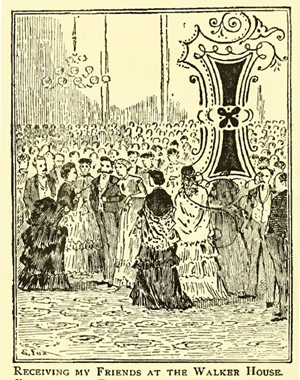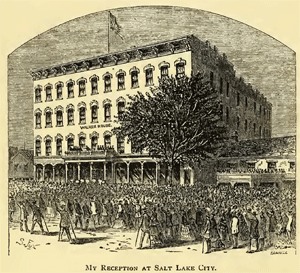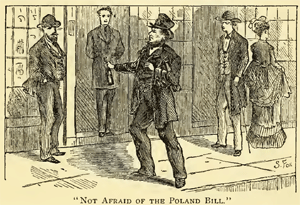Increasing Light. The Equality of the Sexes. Exaggeration Impossible. Likely Saviours. The Present Condition of Mormon Women. The Prospects for the Future. Polygamy Bad for Rich and Poor. A Happy Family. The Happiness Marred. Sealed for Time Only. Building on Another Man's Foundation. The New Wife. How the Old One Fared. The Husband's Death a Relief. As a Calkins's English Mission. What Came of It. How to Get Rich. Two Sermons from One Text. Dividing the Spoil. No Woman Happy in Polygamy.
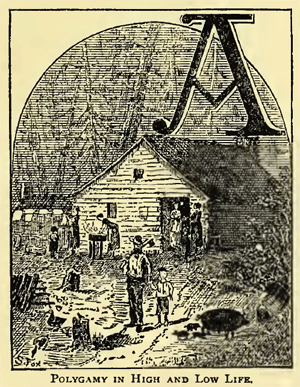
Polygamy in High and Low Life.
ALL this while I was gaining knowledge of the domestic customs and relations of the "Gentiles." At nearly every place that I visited I was entertained in some private family, and my eyes were constantly being opened to the enormities of the wicked system from which I had escaped.
I had felt its misery; I had known the abject wretchedness of the condition to which it reduced women, but I did not fully realize the extent of its depravity, the depths of the woes in which it plunged women, until I saw the contrasted lives of monogamic wives.
I had seen women neglected, or, worse than that, cruelly wronged, every attribute of womanhood outraged and insulted. I now saw other women, holding the same relation, cared for tenderly, cherished, protected, loved, and honored. I had been taught to believe that my sex was inferior to the other; that the curse pronounced upon the race in the Garden of Eden was woman's curse alone, and that it was to man that she must look for salvation. No road lay open for her to the throne of grace; no gate of eternal life swinging wide to the knockings of her weary hands; no loving Father listened to the wails of sorrow and supplication wrung by a worse than death-agony from her broken heart. Heaven was inaccessible to her, except as she might win it through some man's will. I found, to my surprise, that woman was made the companion and not the subject of man. She was the sharer alike of his joys and his sorrows. Morally, she was a free agent. Her husband's God was her God as well, and she could seek Him for herself, asking no mortal intercession. Motherhood took on a new sacredness, and the fatherly care and tenderness, brooding over a family, strengthening and defending it, seemed sadly sweet to me, used as I was to see children ignored by their fathers.
Seeing this, I began to comprehend a little why it was so difficult to make the state of affairs in Utah understood. The contrast was so very great that, unless it was seen, it could not be realized, even ever so faintly. I feel sometimes, both in speaking to audiences, and in private conversations, the thrill of shocked surprise which runs through my listeners' veins as I relate some particular atrocity, or narrate some fearful wrong, which has been suffered either by myself or some person known to me; but even then I know the enormity of the system which permits such things to be possible is but vaguely understood.
I am accused sometimes of exaggeration. In reply to that accusation I would say, that is simply impossible, I could not exaggerate, since language is inadequate to even half unveil the horrors. There are events of daily occurrence which decency and womanly modesty forbid my even hinting at. No one can, even if they would, quite tear the covering away from the foul, loathsome object, called "Celestial Marriage," reeking as it is with filth and moral poison; rotten to the very core; a leprous spot on the body politic; a defilement to our fair fame as a nation. I am compelled to silence on points that would make what I have already said seem tame in comparison. Not a word of all my story is exaggerated or embellished. The difficulty has been rather to suppress and tone down.
Women are the greatest sufferers. The moral natures of the men must necessarily suffer also; but to them comes no such agony of soul as comes to women. Their sensibilities are blunted; their spiritual natures deadened; their animal natures quickened; they lose manliness, and descend to the level of brutes; and these dull-witted, intellectually-dwarfed moral corpses, the women are told, are their only saviours.
What wonder that they, too, become dull and apathetic? Who wonders at the immovable mouths, expressionless eyes, and gray, hopeless faces, which tourists mark always as the characteristics of the Mormon women? What does life offer to make them otherwise than dull and hopeless? Or what even does eternity promise? A continuation merely of the sufferings which have already crushed the womanhood out of them. A cheering prospect, is it not? Yet it is what every poor Mormon woman has to look forward to. Just that, and nothing more.
Rich or poor alike suffer. Polygamy bears no more lightly on the one than the other. If they are poor, they have to work for themselves and their children, suffer every deprivation, submit to every indignity. If they are in more affluent circumstances, they have more time for brooding over their sorrows, more leisure for the exercise of the natural jealousy which they cannot help feeling for the other wives. Happiness and contentment are utterly unknown to Mormon women; they are impossible conditions, either to dwellers in poverty or plenty.
A few years ago, a man and wife of the name of Painter, decided to cast in their lot with the Saints, and enroll themselves among the Lord's chosen people. The woman had been previously married, and her husband had died shortly after his conversion to the Mormon faith. The elders urged her marrying again, and, after a time, she found her heart adding its persuasions to the "counsel" of the brethren, and she married William Painter, an honest, kind-hearted fellow, who made her a good husband, and with whom she lived very happily.
As soon as possible they came to America, but that was not until their family had been increased by two or three children, who were alike the objects of the mother's care and the father's pride. Although they were poor, hard-working people, I have never known a happier family than this when they first came to Utah.
Like all new arrivals they were anxious to receive their Endowments, and it was shortly arranged for them to go through the rites. When they presented themselves at the Endowment House, Heber C. Kimball told the wife that she could only be sealed to her present husband for time. She must belong to her first husband in eternity, he having died in the faith. She was not at liberty to deprive him of his privileges, or to rob him of his kingdom.
The poor woman felt very badly, for this man was the father of her children, and she felt that her claim on him should be the strongest; but the authorities refused to see the matter as she did, and insisted that the sealing should be only for time. There was no help for it, and the poor woman was obliged to submit. Neither was the husband satisfied. It did not suit him to "build a kingdom on another man's foundation;" he must commence one for himself; and, in obedience to counsel, he looked about diligently for a wife "all his own." He was not long in finding one, and, greatly to his wife's distress, he brought home an ignorant young girl, who turned the house topsy-turvy in her endeavors to exercise the authority which she arrogated to herself. The first wife considered that she had some rights still remaining, and that, certainly, she might dictate somewhat concerning household affairs, as she had been so long the ruling power, and understood the manner of regulating and running the domestic machinery; but the new-comer claimed entire supremacy, declaring that she was "the only wife William had," her rival belonging to another man.
Strange as it may seem, the husband took sides instantly with the new-comer against the woman who had been a faithful wife for years, and was the mother of his children. She ruled the household affairs, the first wife, and even the husband and all were compelled to submit to her decision. She heaped every indignity upon the poor wife, even resorting to personal violence, and the victim could obtain neither sympathy nor redress. She was compelled to live under the same roof with her rival, as her husband's means would not admit of two establishments, and for several years she endured the misery silently. We all knew her to be very unhappy, and we pitied her extremely. She was our near neighbor, and the nearest approach to confidences which she ever made was given to my mother. But we did not know for a long time how very much she had to bear.
One cold day, in the midst of a dreary storm, the poor woman came rushing into our house, with her babe in her arms, crying bitterly. She sank into a chair, which my mother placed for her near the fire; and in answer to the anxious inquiries, she sobbed out, "O, sister Webb, I have left my home and my husband. I have been compelled to do it. I can endure no more. If you knew all, I am sure you would not blame me!"
Mother inquired what it was that had occasioned this new rupture, and brought her to this final decision.
The poor, distressed creature replied, that her husband had taken Emma, the second wife, and gone on a visit of several days to some relatives, leaving her and the children utterly unprovided either with food or fire, and they were nearly perishing with cold and hunger. She had sent the other children to another neighbor's to get warm, and she and the younger ones had taken refuge with us.
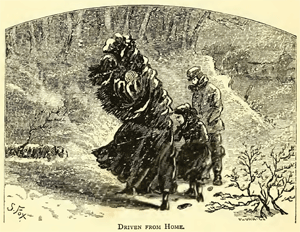
DRIVEN FROM HOME.
In two or three days the husband returned, and finding where his wife was, compelled her to come back to him, by threats of taking the children from her unless she did. After a few years he died, and what little property there was the young wife claimed. The first wife appealed to the church authorities, but they upheld the last wife's claims, and she was driven penniless away with her children. She had to support herself and them; but she used frankly to say, that she was happier than she had been for years, and that her husband's death was a positive relief to her. I knew this woman well, and I knew that no more worthy woman lived than she. Polygamy blighted her life, and made a miserable dependent of one who would have been, in other circumstances, a happy wife.
About fifteen years since, a man by the name of Asa Calkins was sent by Brigham Young to preside over the Saints in the British Isles. He left two wives in Salt Lake, but on his arrival in England, he met with a young lady who completely fascinated him, and having obtained the permission of his Prophet to marry while on the mission, began paying her the most devoted attention.
He met with no difficulty in his wooing, and no obstacle was placed in the way of his speedy marriage. After the marriage, he informed his wives in Utah of the event, and they received the news with resignation, as they expected, nothing different. But he was not so frank with the new wife. Brigham had told him, when he gave him permission to marry, to say nothing about his other wives, so the young English lady supposed herself to be the only Mrs. Calkins. About two years after the marriage, the first went to some of the Eastern states on a visit to some relatives. While there her health became impaired, and on being advised that a sea-voyage would benefit her, wrote at once to her husband in Liverpool, asking permission to join him in England.
He said, in reply, that she might come, if she was willing to pass as his sister, as he had all the wife there that the English law would allow. As she felt obliged to take the voyage on account of her failing health, she agreed to do as he desired.
On her arrival at Liverpool, she found her husband so infatuated with his new wife that he scarcely noticed her at all, and she almost regretted having crossed the sea; yet she saw no way of escape from the trial, as she was to remain there until her husband's mission was ended, which would not be for two years at least.
Mr. Calkins almost entirely ignored the existence of his first wife, and, taking Agnes, travelled all over Europe, introducing her everywhere as Mrs. Calkins, while the poor "sifter" remained in Liverpool. He lavished every luxury of dress and ornament upon his idol, while the poor, neglected wife was supplied with the merest necessities of life.
In course of time, they all returned to Zion; but Agnes still remained the favorite wife. Calkins had always been one of the most prosperous Saints, but he returned from his mission a rich man. About the time of his return we often heard rumors concerning his manner of obtaining this wealth, which were not altogether creditable to him, and, consequently, no one was surprised to hear brother Brigham apply the lash to the delinquent missionary the Sabbath after his arrival at Salt Lake, for what he was pleased to term a species of highway robbery. The Saints universally believed that the man merited the rebuke. But the surprise came the Sabbath following. Brigham changed his tactics, and put in a warm plea in the missionary's defence. He said that he had not distinctly understood all about Brother Calkins's course in England until some time during the previous week, when he had visited him, and explained matters to his entire satisfaction. He omitted to state that "Brother Calkins" not only visited him, but divided the spoils with him, his own share amounting to several thousand dollars.
Mr. Calkins was restored to favor. The English Mrs. Calkins was recognized as the chosen wife, and the other two were merely tolerated, and were obliged to see their husband's devotion and wealth lavished on her, while they starved for love and lacked for comforts.
These two cases show the workings of the polygamic system in the families of the rich and the poor. It is as hateful in the one case as in the other, and equally productive of misery in both.
I have yet to learn of one woman who is happy in it. Like Zina Young, they say, "The system must be right, I suppose; we are taught that it is. But if that is the case, we must live it wrongly; there is fault somewhere."
There is worse than that. There is positive sin; and in her heart of hearts, no woman of them all believes it to be right, although she may try, with all the sophistry at her command, to convince herself that it is. Her heart and her reason both give her arguments the lie, and she cannot help but heed them, even when she counts herself a sinner for so doing.

